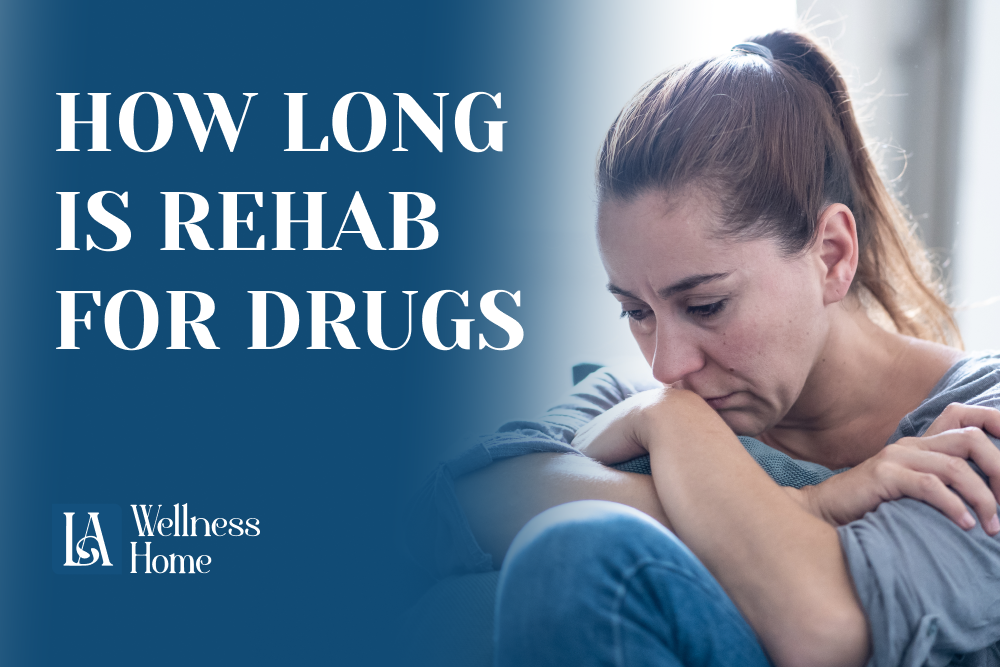If you or someone you love is struggling with drug addiction, a question that often arises is “how long is rehab?” The length of treatment can vary quite a bit depending on the individual situation.
Understanding timelines for drug rehabilitation is important when seeking help for substance abuse. The goal is to allow enough time for effective therapy and counseling, while also supporting the person’s transition back to everyday life after treatment.
Why Duration of Drug Rehabilitation Matters
The length of time spent in drug rehab influences addiction recovery outcomes. According to research by the National Institute on Drug Abuse (NIDA):
- Longer treatment durations are associated with better sobriety rates after completing a program.
- Short-term treatments of less than 90 days often result in prompt relapse.
- Program completion is a powerful predictor of long-term sobriety. Length of stay impacts completion.
Rehab provides a controlled environment to focus fully on recovery, free from the triggers and stressors of normal life. More time in treatment allows for full immersion in the therapeutic process.
However, recovery is also about changing deeply ingrained behaviors and thought patterns around substance abuse. This takes time and continued effort. So aftercare following rehab is just as crucial, which we’ll discuss later.
First, let’s explore the factors that determine the ideal rehab duration for each person.
Key Factors That Influence Length of Addiction Treatment
While there are general rehab timelines, there is no universal formula for exactly how long drug rehab takes. The appropriate length of stay depends on:
Type of Drug Addiction
Certain addictions have longer recommended treatment durations. For example, methamphetamine, heroin, and opioid addictions often require 90 days or more in rehab due to higher relapse risks.
Addictions involving “softer” drugs like marijuana or alcohol may have shorter inpatient program durations in some select cases. Outpatient is also more common.
Poly-substance abuse involves multiple addictions that each require focused therapy, lengthening overall rehab.
Severity and Duration of Drug Abuse
If the substance abuse has been severe and long-lasting over many years, an extended stay in residential rehab may be advised by doctors. This allows more time to fully overcome both the physical and psychological addiction.
For substance abuse issues caught in earlier stages without full physical dependency, a shorter rehab program could still be sufficient.
Dual Diagnosis and Mental Health Factors
The presence of co-occurring mental illnesses like depression, anxiety, PTSD, or other disorders makes rehab more complex. Specialized therapy for dual diagnosis requires additional time.
Cognitive functioning, social skills, underlying trauma, and overall mental wellness impact how quickly someone can progress through the stages of addiction treatment.
Certain personalities and dispositions may also respond better to longer programs with a gentler transition timeline.
Health Complications From Addiction
Poor physical health resulting from prolonged drug abuse can lengthen detox and the medical stabilization phase before therapies can begin.
Certain chronic conditions like liver disease must be managed during treatment, also extending the process.
Treatment History and Response
For those who have relapsed after past rehab attempts, a longer stay may provide the depth of treatment needed for lasting change.
Monitoring how the individual responds to therapies and modifying the timeline accordingly is also key. Customization based on progress ensures enough time without going overboard.
Now that we’ve seen how rehab duration depends on the individual, let’s examine typical timelines for different program types and settings.
Average Drug Rehab Process Duration of Programs
Here is an overview of the average time in rehab for drugs across different programs:
Medical detox
3-10 days on average
Inpatient/Residential rehab
28-90+ days
Partial Hospitalization
20+ hours per week for 6-12 weeks
Intensive Outpatient
9 hours+ per week for 12+ weeks
Standard Outpatient
1-2 hours per week for 12+ weeks
Let’s look more closely at what defines these program types and their usual durations.
Medical Detox: 3-10 Days
Medical detox is often the first step in rehab for those physically dependent on drugs. It involves safely removing toxins from the body under the supervision of doctors, who manage withdrawal symptoms.
On average, the detox process takes 3-5 days for most substance addictions. However, detoxing from certain drugs like alcohol, opioids, benzodiazepines, and meth can prolong this initial phase to 7-10 days or more depending on complications.
Detox alone is not considered comprehensive drug rehabilitation. It is primarily meant to stabilize the body safely so the real work of therapy and counseling can begin.
So after detox, the next steps are entering a residential rehab facility or starting outpatient treatment programming.
28-90+ Days: Long-Term Drug Rehab Effectiveness
Inpatient rehab timeline is the most intensive of drug treatments. This involves living full-time at a facility while undergoing 24/7 medical care and supervision.
Inpatient rehab removes people completely from their former environments and triggers while completely immersing them in treatment activities.
Typical Inpatient Timeline
Days 1-5: Detoxification
- Initial detox and medical stabilization.
Days 6-28: Immersive Counseling & Education
- Individual, group, and family counseling sessions.
- Treatment planning meetings and assessments.
- Education about addiction and life skills.
- Introduction to 12-step programs or alternatives.
Days 29-60+: Transition Planning
- Continued therapies and counseling at reduced intensity.
- Discharge and aftercare action planning.
- Reintegration skills and relapse prevention education.
For long-term patients, experts recommend staying at least 90 days in residential rehab. Studies show better sobriety rates over the first year with 90+ days of treatment.
For milder substance abuse issues, 28-30 days may be adequate, but caution is advised. Modifying duration based on the patient’s progress is ideal.
How Long Does Outpatient Rehab Last?
Outpatient addiction treatment lets you live at home while attending rehab sessions at a clinic or counselor’s office. This option is less disruptive than residential rehab. But you need self-discipline to fully commit to the outpatient schedule.
There are two main levels of outpatient rehab:
Partial Hospitalization – This intensive option involves attending treatment 5-7 days a week for 6-8 hours per day. It provides similar immersion to inpatient but patients sleep at home.
Standard Outpatient – This involves 1-2 hour group and individual therapy sessions 1-3 times weekly. It offers flexibility but less depth.
On average outpatient programs last 2-3 months or 60-120 days, though extended durations may help some individuals. Here is a sample timeline:
- Weeks 1-6: Daily sessions tapering to 5x a week
- Weeks 7-12: 5 sessions per week
- Weeks 13-15: 3 sessions per week
- Weeks 16+: Once or twice-weekly continuing care
How Does Rehab Length Impact Addiction Recovery?
People who finish and commit to longer inpatient rehab tend to have better sobriety rates, according to research.
According to studies by the National Institute on Drug Abuse:
- At least 90 days of inpatient rehab provides significantly better sobriety outcomes. Longer stays show incremental benefits.
- Outpatient rehab should last at least 3 months to achieve meaningful change for many patients.
- Less than 90 days in any rehab program often leads to prompt relapse after discharge.
- However, there are some caveats to consider regarding program duration:
- Success depends on the individual’s level of commitment to their treatment plan, not just the length of stay. Participation in sessions and aftercare matters most.
- The quality of treatment is more important than the quantity or length. Better sobriety rates might come from shorter rehab with an excellent provider compared to long but lower-quality care.
- For less severe addictions, shorter inpatient or outpatient rehab may be enough if it’s combined with strong continuing care after rehab.
There is also the risk of becoming overly dependent on rehab. At some point, implementing coping skills independently becomes crucial.
The key is customizing the rehab plan and timeline for each person’s needs. It should match how they respond to treatment and their readiness to transition out of rehab. Staying flexible makes the best use of limited time and resources.
After Rehab: Importance of Continuing Care
Whether someone undergoes 28 days or 90 days of intensive inpatient rehab or 2-3 months of outpatient programs, rehabilitation must eventually come to an end.
Aftercare services that are essential for reducing relapse risks include:
- Ongoing outpatient counseling and therapy.
- Regular participation in peer support groups like AA or NA.
- Engaging with community mentors and sponsors.
- Transitioning to sober living facilities temporarily.
- Developing accountability partnerships.
- Focusing on health, wellness, and personal growth.
- Continuing medication-assisted treatment if applicable.
With diligent continuing care long after rehab ends, lasting recovery is possible for many people. But the journey doesn’t ever really end – sustaining sobriety requires daily upkeep.
The Bottom Line
There is no one fixed rule for exactly how long drug rehab takes to help someone achieve sobriety. The appropriate treatment duration depends on many individual physical, mental, and environmental factors.
Rehab is not a quick fix. It’s an ongoing process of making and keeping changes in how you think and act around substance abuse. With the right help and your personal commitment to do the hard work, recovery is possible.
If you or someone you care about is struggling with addiction, reach out today. We, at LA Wellness Home, are compassionate professionals who are to help. We have programs to help you or your loved one reclaim your purpose in life. We are ready to guide you through the recovery journey one step at a time.




